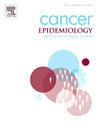在澳大利亚维多利亚州,来自不同文化和语言背景的个体在诊断时患晚期前列腺癌的几率更高
IF 2.3
3区 医学
Q3 ONCOLOGY
引用次数: 0
摘要
澳大利亚癌症计划优先考虑来自不同文化和语言背景(CALD)的个体,将其作为改善癌症治疗经验和结果的干预重点。我们的目的是研究国家综合癌症网络(NCCN)在前列腺癌(PCa)诊断中的风险分类在CALD和非CALD人群之间的差异。方法:我们纳入了维多利亚州前列腺癌结局登记处登记的前列腺癌诊断(2009年2月- 2022年8月)和出生国数据。CALD状态被定义为出生在主要非英语国家(CALD)与澳大利亚或主要英语国家(MESC)。CALD个体进一步按首选口语分组:英语和非英语。我们使用部分比例有序逻辑回归估计CALD状态对NCCN风险类别的影响。结果共有25951人,其中澳大利亚出生18392人(71 %),CALD出生5046人(19 %),mesc出生2513人(10 %)。在4872名具有首选语言数据的CALD个体中,498名(10 %)更喜欢说英语以外的语言。与澳大利亚出生的个体相比,非英语母语的CALD个体表现出更低的低风险(15 %对22 %),但更高的高风险(32 %对21 %)和转移性疾病(18 %对8 %)。与澳大利亚出生的个体相比,CALD个体有更多的晚期(区域性或转移性)疾病(调整优势比[aOR]=1.17, 95 %置信区间[CI]= 1.06-1.29)。非英语CALD患者的晚期前列腺癌明显加重(aOR=1.54, 95 % CI= 1.23-1.94)。结论:来自CALD背景的个体出现高风险或晚期PCa的几率更高。提高对CALD患者前列腺癌的早期发现,需要对潜在因素进行调查,以制定有效的干预措施。本文章由计算机程序翻译,如有差异,请以英文原文为准。
Individuals from culturally and linguistically diverse backgrounds have more advanced prostate cancer at diagnosis in Victoria, Australia
Introduction
The Australian Cancer Plan prioritises individuals from culturally and linguistically diverse (CALD) backgrounds as a focus of interventions aimed at improving cancer care experiences and outcomes. We aimed to investigate differences in the National Comprehensive Cancer Network (NCCN) risk category classification at prostate cancer (PCa) diagnosis between CALD and non-CALD populations.
Methods
We included Victorian Prostate Cancer Outcomes Registry registrants with a PCa diagnosis (February 2009-August 2022) and country-of-birth data. CALD status was defined as birth in a mainly non-English-speaking country (CALD) versus Australia or a mainly English-speaking country (MESC). CALD individuals were further sub-grouped by preferred spoken language: English-speaking and non-English-speaking. We estimated the effect of CALD status on NCCN risk categories using partial proportional ordinal logistic regression.
Results
There were 25,951 individuals: 18,392 (71 %) Australian-born, 5046 (19 %) CALD and 2513 (10 %) MESC-born. Of 4872 CALD individuals with preferred-language data, 498 (10 %) preferred speaking a language other than English. Compared to Australian-born individuals, non-English-speaking CALD individuals presented with less low-risk (15 % vs 22 %) but more high-risk (32 % vs 21 %) and metastatic (18 % vs 8 %) disease. CALD individuals had significantly more advanced (regional or metastatic) disease than Australian-born individuals (adjusted odds ratio [aOR]=1.17, 95 % confidence interval [CI]=1.06–1.29). Non-English-speaking CALD individuals had significantly more advanced PCa (aOR=1.54, 95 % CI=1.23–1.94).
Conclusions
Individuals from CALD backgrounds had greater odds of presenting with high-risk or advanced PCa. Improving early detection of PCa for CALD individuals requires investigation of underlying factors to plan effective interventions.
求助全文
通过发布文献求助,成功后即可免费获取论文全文。
去求助
来源期刊

Cancer Epidemiology
医学-肿瘤学
CiteScore
4.50
自引率
3.80%
发文量
200
审稿时长
39 days
期刊介绍:
Cancer Epidemiology is dedicated to increasing understanding about cancer causes, prevention and control. The scope of the journal embraces all aspects of cancer epidemiology including:
• Descriptive epidemiology
• Studies of risk factors for disease initiation, development and prognosis
• Screening and early detection
• Prevention and control
• Methodological issues
The journal publishes original research articles (full length and short reports), systematic reviews and meta-analyses, editorials, commentaries and letters to the editor commenting on previously published research.
 求助内容:
求助内容: 应助结果提醒方式:
应助结果提醒方式:


